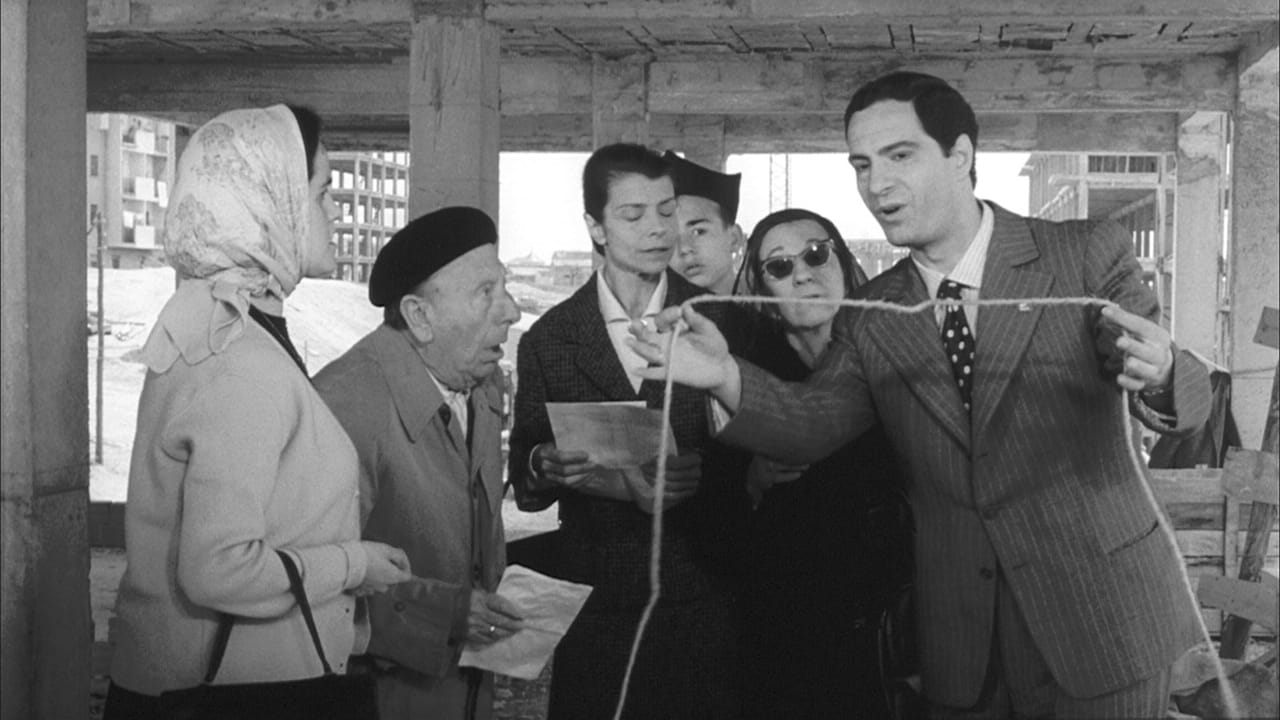

Fiercely funny and unapologetically black, "The Executioner" is among the most entertaining comedies that I have ever seen. Through morbid themes and distressing issues, this masterpiece of the macabre is one of Spanish cinema's many miracles. The pace is as fast as a speeding bullet as visionary filmmaker Luis Garcia Berlanga slyly mocks the heated controversy of capital punishment. Forcing its lead character to choose between traumatizing himself and living a life of poverty, Berlanga is masterfully able to turn transform tragedy into farce.While the constant comedy may seem to some as no more than silly distraction from the social commentary, I sensed not only a consistent sense of farcical satire in the masterwork, but also a consistent sense of dread and awareness. The film can be split into two halves: the first being a slightly morbid, but utterly charming romantic comedy, and the second being a much more bleak work of direful, tragicomic satire. Many satires have the unfortunate flaw of paying much more attention to their message than the quality of their script, characters, and plot; "The Executioner" shares all of these traits. Beyond the black and social critiques, there are some highly likable characters and a flat-out amazing premise, satirical or not.Chaotic, sad, and laugh-out-loud hilarious in equal measure, it is hard to determine whether "The Executioner" is a work that leaves an imprint of joy or sorrow. My reaction is one of both, for the ambiguous ending serves as both a punchline and a bone chilling reminder of the unpredictable tragedies hidden deep within the human experience.
... View MoreAnother masterpiece by the notorious filmmaker Luis Garcia Berlanga who shows the lively as well as sad existence of an executioner . Maestro Berlanga realizes another excellent film plenty of irony , habits , Spanish social life , good feeling and political critical . An undertaker (Nino Manfredi) gets married to an old executioner (Jose Isbert)'s daughter (Emma Penella) and, although he doesn't like it, must continue the profession of his father-in-law after his retirement . However , his profession is not exactly what you could call ¨popular¨ . As when the old man retires, his place is vacant , as his son-in-law doesn't like at all becoming an executioner, but that is the only way to keep the house where he is going to live after getting married. This is an enjoyable story that contains busy comedy , humor , frantic pace , blatant critical against death row , amusing gags , rowdy satire , noisy hustle and is pretty entertaining . It is considered to be one of the best films from Spanish cinema history and has been voted second best Spanish film by professionals and critics in 1996 cinema centenary .The main and support actors stand out under perfect direction of Berlanga , including sour criticism as well as carried out in previous and subsequent works such as ¨Placido or Escopeta Nacional¨ that include bitter , pessimistic descriptions of social classes . In ¨el Verdugo¨ we can find very fun characters, all of them caricatures of the "spanish way of life" and a mirror on the Spanish society by that time . ¨El Verdugo¨ (1963), one of the undisputed masterpieces and fundamental in filmography of Luis Garcia Berlanga where shows the miseries of an amoral society and shot at the height of his creativity, in a period cultural difficult, where the enormous censorship of the political regime, exacerbated the ingenuity and imagination of the scriptwriters . Awesome playing by Nino Manfredi as a naive , ingenuous ,gentle undertaker turned into executioner , an agreeable Emma Penella and of course , the great Jose Isbert , Berlanga's habitual , in the best interpretation of his long career . The movie displays a Spanish secondary star-studded such as : Maria Luisa Ponte , Jose Maria Prada , Angel Alvarez , Xan Das Bolas , Alfredo Landa , Agustin Gonzalez , Chus Lampreave , Jose Saza , Julia Caba Alba , Antonio Ferrandis , Jose Luis Coll , Felix Fernandez , Jose Orjas and the likable Jose Luis Lopez Vazquez who improvised the moment when measured the child's head , among others . Evocative cinematography in white and black by Tonino Delli Colli , Sergio Leone's usual cameraman ; being filmed on location in Island of Mallorca , Madrid exteriors and C.E.A. studios , Ciudad Lineal, Madrid. Atmospheric and adequate musical score by Miguel Asins Arbo .Direction by Luis Garcia Berlanga is very good , he shows his skill for edition , realizing long shots with crowd who moves easily Berlanga filmed several polemic movies during the 50s , all of them were beset by difficulties with the censors caused by real critical to social stratum such as ¨Bienvenido Mister Marshall¨ (1953) , a very good film which tended not to be very well received by the censor for its acidity and considered to be one of the best Spanish films of the history ; however, his strong portrait of Spanish society , plenty of sharpness , didn't please the pro-Franco authorities . His next joint venture was ¨Los Jueves, Milagro¨ (1957), it was modified by the censors and delayed for several years before its eventual release . Later on , Berlanga made one of his best films ¨Placido¨ (1961) masterfully played by Cassen , this is the film debut for the great producer Alfredo Matas and received an Oscar nomination in 1963 , being well-received at the International Festivals , reviewing the useless charity , it's a sublime film but with censorship realized by this great maestro Luis Garcia Berlanga . He continued filming other interesting pictures as in 1973 he went to Paris to begin filming ¨Grandeur nature¨ with Michael Piccoli , another problematic film , focusing this time on the fetishism of a man who falls in love with a doll . Several years later , after Franco's death, he filmed a trilogy comprising ¨La Escopeta Nacional¨ (1978), ¨Patrimonio Nacional¨ (1981) and ¨Nacional III¨ (1982), where he clarified the evident disorders in the Spanish upper , middle-class upon being confronted with a new political status quo , realizing a sour denounce of the Spanish society . Berlanga ulteriorly shot a peculiar film titled ¨La Vaquilla¨ (1985) plenty of Spanish-star-cast and set in the Spanish Civil War , resulting to be the first time dealing with this convulsive period in comedy style . Following the same themes, he went on filming coral films such as ¨Moros and Cristianos¨ and ¨Todos a Carcel¨ (1993) that won three Goya Awards for Best Film, Best Director and Best Sound ; being his final film : ¨Paris Tombuctu¨. Rating ¨El Verdugo¨ : 8'5 , pretty good . Essential and indispensable watching for Berlanga aficionados . Better than average and well worth seeing . Essential and indispensable seeing .
... View MoreAnother lesson of Berlanga about how to criticize the society avoiding censorship. "El Verdugo" looks like a comedy, sounds like a comedy, tastes like a comedy... But it is actually a fierce critic of the death penalty. The final sequence of this movie is one of the most brilliant ever (you cannot tell who's the criminal and who's the executioner!!!).And what to say about the great José Isbert?? He was a character himself, with that voice, and that physique. I don't know if he was a genius, I just can say that there will never be another actor like him.Berlanga + Azcona: an unbeatable team.*My rate: 10/10
... View MoreHere we have a tragicomedy about executions released in 1963, when executions and censorship did still exist in Spain. How did they do it...? I only can say... using their imagination. It has a really brilliant story, and a screenplay that combines in a so wise way the comic and dramatic/tragic aspects of the story. Also, the actors know at every moment what to do. As a result we find a really funny film, a really sad film... and a perfect recreation of the reaction of common people to a hard and dangerous epoque. A masterpiece in my opinion.
... View More